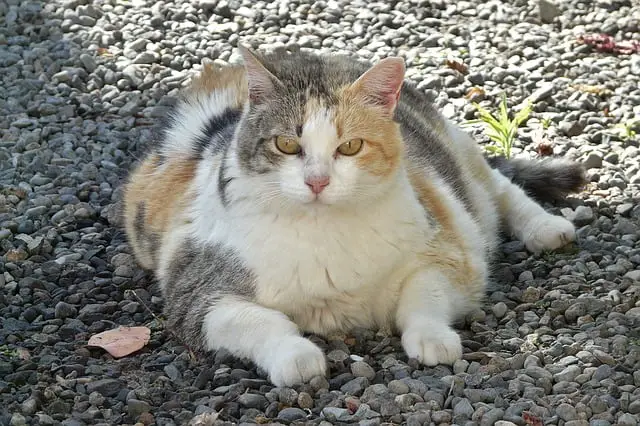
Are you afraid that your cat has put on a few extra pounds? Let’s see how to understand if the cat is overweight and how to help it lose weight.
A sedentary routine or an uninspiring apartment life could make the cat lazy. In this case, there is a risk that the feline will accumulate excess weight. How to tell if the cat is overweight? Just look at it: let’s find out all the secrets of the best techniques.
How to tell if the cat is overweight
If you are wondering how to tell if your cat is overweight, know that there are very simple techniques to find out. Let’s see together the best tricks to put into practice to solve this doubt about the physical shape of the cat.
- Lift the cat: sometimes, a change in the weight of the animal can be noticeable even just by taking it in your arms. Lately do you have more difficulty lifting Fuffy off the ground? Probably the reason is that it took a few extra pounds!
- Observe the cat: if a cat is overweight, or even worse obese, you can understand it even simply by looking at it. What are the characteristics that allow us to identify a fat cat? First, the presence of fat pads at the abdomen, lumbar area, spine and tail. Can’t you palpate the cat’s ribs, or do you barely and with much difficulty? This is another sign that indicates that the animal is overweight. Finally, look at the feline from above: does life appear clearly visible or, on the contrary, poorly delineated? Here is another clue about the condition of the cat’s silhouette.
- How is the cat’s gait? Does the cat walk with difficulty, showing themselves panting and fatigued? Despite its kind of belonging, is it anything but agile and athletic? Most likely, it is an obese animal.
The risks to the health of the cat
Although at first glance an overweight cat may seem tender and cuddly, in reality the excess weight represents a serious danger to the health of our four-legged friend. This condition, in fact, exposes it to the onset of numerous pathologies, including:
- Diabetes in cats
- Urinary tract diseases
- Arthritis
- Skin diseases
- Cardiovascular problems
- Hepatic impairment
The cat is overweight: what to do?

Establishing a priori the ideal weight of the cat is not at all simple. In fact, numerous variables intervene, such as the age, sex and race of the cat. A cat tends to be overweight when its weight exceeds 30% of its healthy weight.
To establish the ideal weight of the cat, the best advice is to turn to the veterinarian, who will proceed to weigh the feline, monitoring its silhouette over time. In this way, you will be sure to timely detect any conditions of overweight and obesity.
Now that we have found out how to tell if the cat is overweight, let’s see what to do in such cases:
- Correct the cat’s diet, making sure that the foods you give Fluffy are low in fat and sugar. Also, keep an eye on the portions that the animal takes daily. If the cat also has access to the outside, check that the cat, as a good cunning and greedy, does not also eat somewhere else.
- Avoid rewarding it with snacks, during the game or when the animal behaves well. If you really do not want the cat to give up the small reward snack, choose a low-calorie food that is able to satiate the feline.
- Stimulate the cat with games and activities, to make sure that the Fluffy makes movement while having fun. Playing with the cat is not only an essential habit to make it lose weight without feeling the effort, but also serves to strengthen your bond and to spend moments of leisure and joy together.
- If the cat appreciates it, take it for a walk. Ever thought of taking the cat out on a leash? There are cats who love to walk and explore the surroundings in total safety and in your company. A great way to make Fluffy lose weight by focusing everything on the pleasure of discovery!
Despite all your efforts, the cat just can’t lose weight? Contact your veterinarian for nutritional advice: after identifying the problem, the professional will formulate a
specific food plan on the needs of your four-legged friend.






